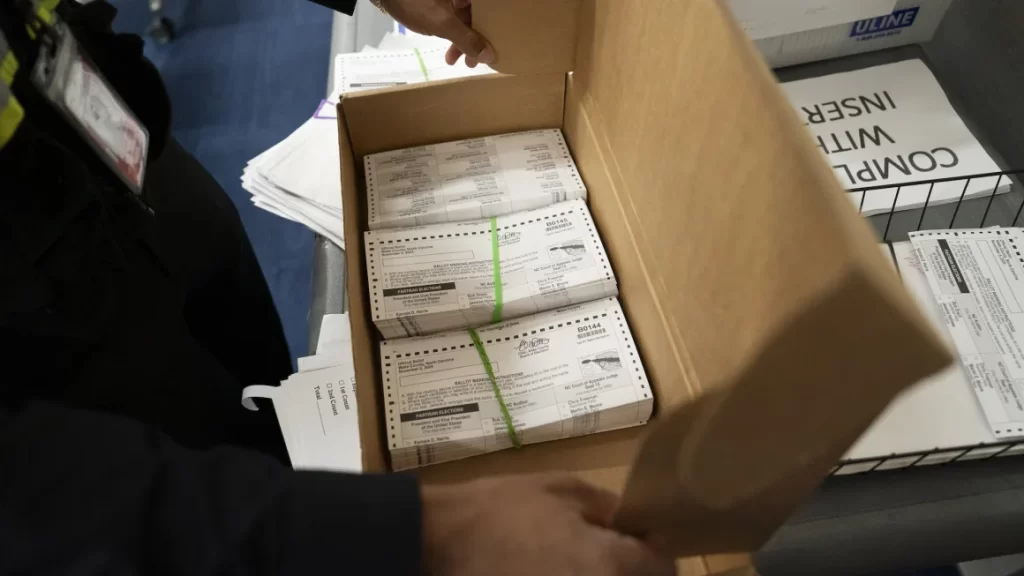Judges in Michigan and North Carolina have dismissed lawsuits filed by the Republican National Committee (RNC) and other parties that sought to challenge overseas ballots cast by voters who never resided in those states. These rulings, issued on Monday, mark significant setbacks for Republican efforts to scrutinize the overseas voting process, which has traditionally been associated with military voters but is increasingly seen as an important demographic for Democrats due to the growing number of civilian expatriates.
Former President Donald Trump and his GOP allies promoted these lawsuits as vital to ensuring the integrity of the upcoming 2024 elections. However, their arguments were met with skepticism in court. A judge in Michigan characterized the lawsuit as an “attempt to disenfranchise” voters, while a North Carolina judge stated that the RNC failed to present “substantial evidence” of any fraud they claimed to be addressing.
The RNC’s legal actions aimed to block state policies that allow citizens living abroad to cast ballots in Michigan and North Carolina, based on familial ties to residents who had previously lived in those states. In Michigan, this applies to voters whose parents or spouses were residents before they left the country.
Judge Sima Patel of Michigan’s Court of Claims dismissed the RNC’s suit, noting that the lawsuit was filed too close to Election Day. She described it as an “11th hour attempt to disenfranchise” the spouses and children of former Michigan residents now living abroad.
In North Carolina, Wake County Superior Court Judge John W. Smith similarly rejected the RNC’s request for an emergency order to set aside ballots from overseas voters who had never lived in the state. He emphasized that the voting policies in question had received bipartisan support from the state legislature and that the RNC had provided no substantial evidence of fraudulent activities occurring as a result of these policies.
CNN has reached out to both the RNC and the Democratic National Committee (DNC) for comments on the rulings, as well as to election officials in both states.
Michigan Secretary of State Jocelyn Benson, who was a defendant in the RNC’s lawsuit, celebrated the ruling as a victory for voters and democracy. In a social media post, she highlighted the court’s conclusion that the GOP was attempting to disenfranchise certain voters.
The policies allowing overseas voting have been in effect for several years, but since 2016, civilian voters living abroad have begun to outnumber military voters. This demographic shift has led Democrats to invest significantly in efforts to mobilize eligible voters overseas, particularly in battleground states. Michigan Republicans cited these mobilization efforts in their legal challenge.
Judge Patel pointed out that the RNC’s lawsuit was filed just weeks before the election and well after the federal deadline for states to send ballots to overseas voters. “It would be extremely difficult or impossible for defendants to design and carry out a program to reject potentially thousands of [absentee voter ballots] at this time,” she wrote, highlighting the busy period that election officials face leading up to the election.
The judge expressed skepticism towards the Republicans’ claims that Michigan’s residency requirements, as outlined in the state constitution, prohibited the inclusion of overseas voters who had never resided in the state. She supported the election officials’ arguments that the state constitution grants the legislature authority to expand the eligible voter pool.
According to Michigan officials, approximately 16,000 requests for overseas ballots have been received so far. While this figure represents a small fraction of the electorate, it is notable when considering that there are 8.4 million registered voters in the state, with over 5.5 million participating in the 2020 election.
As these legal battles unfold, the implications for overseas voting and the overall electoral landscape remain significant, especially as both parties strategize for the upcoming elections. The rulings affirm the importance of maintaining established voting rights for overseas citizens, particularly as the demographic of expatriate voters continues to evolve.









